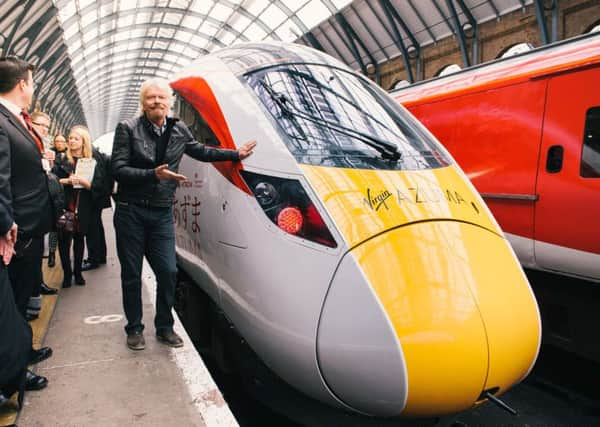New fleet of trains to cut journey times on Doncaster's mainline rail link


Virgin Trains says the new fleet on the East Coast Main Line will reduce times by up to 22 minutes,
The trains, which will be launched in 2018, will enable passengers to travel between London and Edinburgh in four hours.
Advertisement
Hide AdAdvertisement
Hide AdThey will accelerate from 0-125mph around a minute quicker than the current fleet.
Sir Richard Branson, founder of the Virgin Group, unveiled the first of the new trains at London King’s Cross.
The 65 new trains will be built by Japanese firm Hitachi at its manufacturing plant in Newton Aycliffe, County Durham.
They will be named Virgin Azuma, which is the Japanese translation for “east”.
Advertisement
Hide AdAdvertisement
Hide AdSir Richard said: “This is a hugely important moment for passengers on the East Coast.
“A line which has witnessed the historic Flying Scotsman and Mallard will now see passenger services transformed with the UK’s most advanced long distance trains.
“Our customers on the West Coast have already seen what Virgin can bring to train travel and how the Pendolinos have made a huge difference to speed and comfort.
“Our new fleet of Azumas will bring a similar transformation to the East Coast, and propel one of the UK’s most prestigious lines into the 21st Century.”
Advertisement
Hide AdAdvertisement
Hide AdVirgin said the trains would provide 12,200 extra seats and increase peak-time capacity into King’s Cross by 28%.
It is working with Network Rail and other industry bodies to investigate the potential for the East Coast route to be upgraded to allow trains to operate at 140mph.
The interior of the Azumas has not been finalised, but Virgin claimed they will offer some of the best leg-room on the network, faster and free wi-fi, an enhanced system for highlighting reserved seats and more overhead luggage space.
Transport Secretary Patrick McLoughlin said: “The state-of-the-art Intercity Express trains heading to Virgin will transform rail travel for passengers between London, the North East and Scotland.
Advertisement
Hide AdAdvertisement
Hide Ad“These new trains, combined with Virgin’s exciting plans for the franchise, will provide more services, more seats and faster journeys, helping to place passengers at the heart of the railway.”
Railway historian and author Christian Wolmar told the Press Association that the deal was not the most cost-effective way of getting new trains on to Britain’s railways.
He said: “Clearly it’s great news the East Coast is getting new trains but it’s an extremely expensive train under a very complicated contract.
“It’s completely the wrong way to purchase trains. Passengers will be paying the price for that for many years to come.”
Advertisement
Hide AdAdvertisement
Hide AdMr Wolmar claimed there are “much simpler possible arrangements” to obtain new trains, such as through a rolling stock company.
He said the contract with Hitachi is “an attempt to pass on the risk” to the manufacturer by stipulating the required rate of production.
“Once you try and transfer risk to the private sector they charge an awful lot for it,” Mr Wolmar said. “These will be very expensive trains to lease.”
In 2011 the Department for Transport awarded a £5.7 billion contract to a consortium led by Hitachi to provide 122 new high-tech trains for the Great Western route from next year and the East Coast line from 2018.
The Japanese company’s purpose-built £82 million facility in the North East - where the majority of the fleet will be built - was opened by Prime Minister David Cameron in September last year.